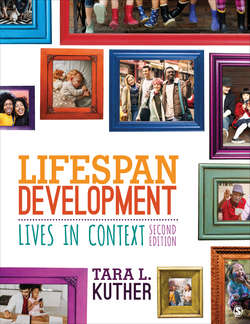Читать книгу Lifespan Development - Tara L. Kuther - Страница 396
На сайте Литреса книга снята с продажи.
What Do You Think?
Оглавление1 Is the development of theory of mind universally important? That is, is theory of mind important in all cultures? How might context determine the relevance of theory of mind?
2 How does theory of mind contribute to moral reasoning and behavior?
Cross-cultural research suggests that children in diverse cultures in Europe, Africa, Asia, Southeast Asia, and North and South America differentiate moral, social conventional, and personal issues (Killen, McGlothlin, & Lee-Kim, 2002; Turiel, 1998; Yau & Smetana, 2003). However, cultural differences in socialization contribute to children’s conceptions. For example, a study of Chinese children ages 3 to 4 and 5 to 6 showed that, similar to Western children, the Chinese children overwhelmingly considered personal issues as permissible and up to the child, rather than the adults. The children’s consideration of moral transgressions varied. The Chinese children tended to focus on the intrinsic consequences of the acts for others’ welfare and fairness, as compared with the emphasis on avoiding punishment common in Western samples of preschoolers (Yau & Smetana, 2003). These differences are consistent with cultural preferences for collectivism and individualism. Whereas Western parents tend to emphasize individuality and independence, Chinese parents tend to emphasize children’s obligations to the family and community (Chao, 1995; Yau & Smetana, 2003). One study of 4-year-old Chinese children and their mothers showed that mothers consistently drew children’s attention to transgressions, emphasizing the consequences for others. The children learned quickly and were able to spontaneously discuss their mothers’ examples and strategies, as well as reenact them in their own interactions, and their explanations reflected their own understanding of rules and expectations in their own terms, rather than reflecting simple memorization (Wang, Bernas, & Eberhard, 2008).
How adults discuss moral issues, such as truth telling, harm, and property rights, influences how children come to understand these issues. When adults discuss moral issues in ways that are sensitive to the child’s developmental needs, children develop more sophisticated conceptions of morality and advance in their moral reasoning (Janssens & Dekovic, 1997; Walker & Taylor, 1991). As we have seen, there are cultural differences in how people think about moral and conversational issues—and these conceptualizations are communicated, internalized, and transformed by children as they construct their own concepts about morality. Culture also influences how we think about others and our ability to take their perspectives, as discussed in the Cultural Influences on Development feature.
